- Home
- Sue Grafton
M is for MALICE Page 5
M is for MALICE Read online
Page 5
In the meantime, since the office was nearly empty, I asked one of the DMV clerks to check the name through her computer.
She turned and gave me her full attention. “Are you nuts? I could get fired for doing that,” she said. She turned the monitor on its swivel so I couldn’t peek at the screen.
“I’m a PI,” I said.
“You could be the Pope for all I care. You’ll have to wait to hear from Sacramento. You get nothing from me.”
“It was worth a try,” I said. I tried a winsome smile, but it didn’t get me far.
“You got a nerve,” she said. She turned away with a reproving shake of her head and began to pack away her desk.
So much for my powers of persuasion.
Chapter 4
*
I returned to the office, typed up the envelope, wrote a check to the state, attached it to the form, affixed a stamp, and stuck the packet in the box for outgoing mail. Then I picked up the phone and called Darcy Pascoe, the secretary/receptionist at California Fidelity Insurance. We chatted briefly about the old days and I caught up on minor matters before making the same request to her that I’d made to the DMV clerk. Insurance companies are always running DMV checks. Darcy wasn’t actually authorized to inquire, but she knew how to bend the rules with the best of them. I said, “All I need is a mailing address.”
“What’s your time frame?”
“I don’t know. How about the first thing tomorrow?”
“I can probably do that, but it’ll cost you. What’s this kid’s name again?”
*
When I got home, lights were on in the apartment, but Dietz was still out someplace. He’d brought in a soft-sided suitcase that he’d placed beside the couch. A quick check in the closet showed a hanging garment bag. In the downstairs bathroom, his Dopp kit was sitting on the lid to the toilet tank. The room smelled of soap and there was a damp towel hung across the shower rod. I went back to the kitchen and turned on the radio. Elvis was singing the final chorus of “Can’t Help Falling In Love.”
“Spare me,” I said crossly and turned the thing off. I went up the spiral stairs to the loft where I kicked off my Reeboks and stretched out on the bed. I stared up at the skylight. It was well after five o’clock and the dark had fallen on us like a wool blanket, a dense, leaden gray. Through the Plexiglas dome, I couldn’t even see the night sky because of the overcast. I was tired and hungry and strangely out of sorts. Being single can be confusing. On the one hand, you sometimes yearn for the simple comfort of companionship; someone to discuss your day with, someone with whom you can celebrate a raise or tax refund, someone who’ll commiserate when you’re down with a cold. On the other hand, once you get used to being alone (in other words, having everything your way), you have to wonder why you’d ever take on the aggravation of a relationship. Other human beings have all these hotly held opinions, habits, and mannerisms, bad art and peculiar taste in music, not to mention mood disorders, food preferences, passions, hobbies, allergies, emotional fixations, and attitudes that in no way coincide with the correct ones, namely yours. Not that I was thinking seriously of Robert Dietz in this way, but I’d noticed, walking into the apartment, an unnerving awareness of the “otherness” of him. It’s not that he was intrusive, obnoxious, or untidy. He was just there, and his presence acted on me like an irritant. I mean, where was this going? Nowhere that I could tell. I’d no more than get used to him than he’d hit the road again. So why bother to adjust when his company wasn’t permanent? Personally, I don’t consider flexibility that desirable a trait.
I heard a key turn in the lock and I realized, with a start, I’d drifted off to sleep. I sat up, blinking fuzzily. Below me, Dietz was turning on additional lights. I could hear the crackle of paper. I got up and moved over to the railing, looking down at him. He turned on the radio. I put my fingers in my ears so I wouldn’t have to listen to Elvis sing soulfully about love. Who needs that shit? Dietz was a big country music fan and I was hoping he’d flip the station to find something more twangy and a lot less to the point. He sensed my presence and tilted his face in my direction. “Good. You’re home. I didn’t see your car outside,” he said. “I picked up some groceries. You want to help me unload?”
“I’ll be there in a minute.” I made a quick detour to the bathroom, where I ran a comb through my hair, brushed my teeth, and availed myself of the facilities. I’d forgotten how domesticated Dietz could be. When I thought about the man, it was his personal-security expertise that came foremost to mind. I padded down the stairs in my sock feet. “How’d you know what we needed?”
“I checked. Surprise, surprise. The cupboards were bare.” He had the refrigerator open, placing eggs, bacon, butter, lunch meats, and various other high-fat, high-cholesterol items in the bins. On the counter was a six-pack of beer, two bottles of Chardonnay, extra-crunchy peanut butter, canned goods and assorted condiments, along with a loaf of bread. He’d even remembered paper napkins, paper towels, toilet paper, and liquid detergent. I put the canned goods in the cabinet and turned off the radio. If Dietz noticed, he said nothing.
Over his shoulder, he said, “How’d the interview go?
I said, “Fine. I haven’t made a lick of progress, but you have to start someplace.”
“What’s the next move?”
“I’m having Darcy run a DMV check through the insurance company I used to work for. She hopes to have something early tomorrow morning. Then we’ll see what’s what. I have other lines of pursuit, but she’s my best bet so far.”
“You’re not working for California Fidelity these days?”
“Actually, I’m not. I got my ass fired because I wouldn’t kiss someone else’s. I rent an office in a law firm. It works out better that way.”
I could see him toy with other questions, but he must have decided that the less said the better.
He changed the subject. “Can I talk you into eating out?”
“What’d you have in mind?”
“Something in walking distance where we don’t have to dress.”
I looked at him for a moment, feeling strangely unwilling to cooperate. “How’s the old friend?”
Dietz suppressed a smile. “He’s fine. Is that what’s bothering you?”
“No. I don’t know. I think I’ve been depressed for weeks and just now got in touch with it. I’m also nervous about the job. I’m working for my cousin Tasha, which I probably shouldn’t be doing.”
“A cousin? That’s a new one. Where did she come from?”
“God, you are out of date.”
“Grab a jacket and let’s go. You can talk about it over dinner and bring me up to speed.”
We walked from my apartment to a restaurant on the breakwater, three long blocks during which little was said. The night was very chilly and the lights strung out along the harbor were like leftover Christmas decorations. Over the softly tumbling surf, I could hear the tinkle of a buoy, the tinny sound mixing with the gentle lapping of water against the boats in the marina. Many vessels were alight and the occasional glimpses of the live-aboards reminded me of a trailer park, a community of small spaces, looking cozy from outside. Dietz’s pace was rapid. He had his head bent, his hands in his pockets, heels clicking on the pavement. I kept up with him, my mind running back over what I knew of him.
His upbringing had been a strange one. He’d told me he was born in a van on the road outside Detroit. His mother was in labor and his father was too impatient to find an emergency room. His father was a brawler and a bully who worked the oil rigs, moving his family from one town to the next as the mood struck. Dietz’s granny, his mother’s mother, traveled with them in the vehicle of the moment ��� a truck, a van, or a station wagon, all secondhand and subject to breakdown or quick sale if the money ran low. Dietz had been educated out of an assortment of old textbooks while his mother and granny drank beers and threw the cans out the window onto the highway. His dislike of formal schooling was an attribute we shared.
Because he’d had so little experience with institutions, he was fiercely insubordinate. He didn’t so much go against regulations as ignore them, operating on the assumption that the rules simply didn’t apply to him. I liked his rebelliousness. At the same time, I was wary. I was into caution and control. He was into anarchy.
We reached the restaurant, the Tramp Steamer, a cramped and overheated gray-frame establishment located up a narrow flight of wooden stairs. A modest effort had been made to give the place a nautical feel, but its real attraction was the fared raw oysters, fried shrimp, peppery chowder, and homemade bread. There was a full bar near the entrance, but most of the clientele preferred beer. The air was saturated with the smell of hops and cigarette smoke. Between the honky-tonk jukebox, the raucous laughter, and conversations, the noise was palpable. Dietz scanned the room for seating, then pushed through a side door and found us a table on the deck, overlooking the marina. Outside, it was quieter and the chill air was offset by the red glow of wall-mounted propane heaters. The briny scent of the ocean seemed stronger up here than it had down below. I took. a deep breath, sucking it into my lungs like ether. It had the same sedative effect and I could feel myself unwind.
“You want Chardonnay?” he asked.
“I’d love it.”
I sat at the table while he moved back inside to the bar. I watched him through the window in conversation with the bartender. As he waited for the order, his gaze moved restlessly across the crowd. He crossed to the jukebox and studied the selections. Dietz was the sort of man who paced and tapped his fingers, subterranean energy constantly bubbling to the surface. I seldom saw him read a book because he couldn’t sit still that long. When he did read, he was out of commission, utterly absorbed until he was finished. He liked competition. He liked guns. He liked machines. He liked tools. He liked climbing rocks. His basic attitude was “What are you saving yourself for?” My basic attitude was “Let’s not jump right into things.”
Dietz wandered back to the bar and stood there jiggling the change in his pocket. The bartender set a mug of beer and a glass of wine on the counter. Dietz peeled off some bills and returned to the deck, trailing the smell of cigarette smoke like a strange aftershave. He said, “Service is slow. I hope the food’s good.” We touched glasses before we drank, though I wasn’t sure what we were drinking to.
I opened a menu and let my eyes trace the choices. I wasn’t really that hungry. Maybe a salad or soup. I usually don’t eat much at night.
“I called the boys,” he remarked.
“And how are they?” I asked. I’d never met his two sons, but he spoke of them with affection.
“They’re fine. The boys are great,” he said. “Nick turns twenty-one on the fourteenth. He’s a senior at Santa Cruz, but he just changed his major so he’ll probably be there another year. Graham’s nineteen and a sophomore. They’re sharing an apartment with a bunch of guys this year. They’re smart kids. They like school and seem to be motivated. More than I ever was. Naomi’s done a good job, without a lot of help from me. I support ‘em, but I can’t say I ever spent much time on the scene. I feel bad about that, but you know how I am. I’m a rolling stone. I can’t help it. I could never settle down and buy a house and work nine to five. I can’t behave myself in a situation like that.”
“Where’s Naomi?”
“San Francisco. She got a law degree. I paid her tuition ��� I’m good about that end ��� but all the hard work was hers. The boys say she’s getting married to some attorney up there.”
“Good for her.”
“How about you? What have you been up to?”
“Not a lot. Mostly work. I don’t take vacations so I haven’t been anywhere that didn’t somehow involve a stakeout or a background check. I’m a bundle of laughs.”
“You should learn how to play.”
“I should learn how to do a lot of things.”
The waitress approached, moving toward us from a table in the angle of the deck. “You two ready to order?” She was probably in her late twenties, a honey blond with her hair in a boy-cut and braces on her teeth. She wore matching black shorts and tank top as if it were August instead of January 8.
“Give us a minute,” Dietz said.
We ended up splitting a big bowl of steamed mussels, nestled in a spicy tomato broth. For entrees, Dietz had a rare steak and I had a Caesar salad. We both ate as though we were racing against the clock. We used to make love the same way, like some contest to see who could get there first.
“Tell me about the depression,” he said when he had pushed his plate aside.
I gestured dismissively. “Forget it. I don’t like to sit around feeling sorry for myself.”
“Go ahead. You’re allowed.”
“I know I’m allowed, but what’s the point?” I said. “I can’t even tell you what it’s about. Maybe my serotonin levels are off.”
“No doubt, but what’s the rest of it?”
“The usual, I guess. I mean, some days I don’t get it, what we’re doing on the planet. I read the paper and it’s hopeless. Poverty and disease, all the bullshit from politicians who’d tell you anything to get elected. Then you have the hole in the ozone and the destruction of the rain forests. What am I supposed to do with this stuff? I know it’s not up to me to solve the world’s problems, but I’d like to believe there’s a hidden order somewhere.”
“Good luck.”
“Yeah, good luck. Anyway, I’m struggling for answers. Most of the time, I take life for granted. I do what I do and it seems to make sense. Once in a while I lose track of where I fit. I know it sounds lame, but it’s the truth.”
“What makes you think there are any answers?” he said. “You do the best you can.”
“Whatever that consists of,” I remarked.
“Therein lies the rub.” He smiled. “What about the job? What scares you about that?”
“I always get amped on the eve of a big one. One of these days I’m going to fail and I don’t like the thought, It’s stage fright.”
“Where’d the cousin come from? I thought you didn’t have any family.”
“Don’t I wish,” I said. “Turns out I have a bunch of cousins up in Lompoc, all girls. I’d prefer not to have anything to do with them, but they keep popping up. I’m too old to cope with ‘togetherness.’ “
“Such a liar,” he said fondly, but he let it pass.
The waitress came by. We declined dessert and coffee. Dietz asked for the check, which she produced from a sheaf tucked in the small of her back, taking a few seconds to total it out. Her yellow socks and black hightops really gave the outfit some class. She placed the bill facedown on the table slightly closer to Dietz’s side than to mine. This was probably her tactic for playing it safe in case we were a twosome whose roles were reversed.
She said, “I can take that anytime you want.” She moved off to deliver ketchup to another table. She must have the metabolism of a bird. The cold wasn’t even producing goose bumps.
Dietz glanced at the check briefly, recalculating the total in the blink of an eye. He leaned sideways to extract his wallet and pulled out a pair of bills that he slid under his plate. “Ready?”
“Whenever you are.”
We took the long way home. It seemed easier talking in the dark without looking at each other. The conversation was superficial. I’m an expert at using words to keep other people at bay. When we got home, I made sure Dietz had everything he needed ��� sheets, two pillows, an extra blanket, a small alarm clock, and a fresh towel ��� all of life’s little amenities, except me.
I left him below and headed up the spiral stairs. When I got to the top, I leaned over the rail. “With your bum knee, I take it you won’t be jogging with me in the morning.”
“Afraid not. I’m sorry. It’s something I miss.”
“I’ll try not to wake you. Thanks for dinner.”
“You’re welcome. Sleep well.”
“Use your ice pack
.”
“Yes ma’am.”
As it turned out, I slept a lot sooner than he did. Dietz was a night owl. I’m not sure how he occupied himself. Maybe he polished his boots or cleaned his handgun. He might have watched late-night television with the sound turned down. I sure never heard him. Once in a while, in turning over, I realized the light was still on in the living room. There was something so parental about his being on the premises. One thing about being single, you don’t often feel protected. You tend to sleep with your mental shoes on, ready to leap up and arm yourself at the least little noise. With Dietz on guard duty, I got to cruise through a couple of rounds of REM, dreaming right up to the split second before the alarm went off. I opened my eyes, reached out, and caught it just before it blared.
I did my morning ablutions behind closed doors so the sound of running water wouldn’t carry. Shoes in hand, I crept down the stairs in my stocking feet and tiptoed out the front door without waking him. I laced up, did a quick stretch, and set off at a fast walk to get warmed up. The night had shifted from pitch black to charcoal gray and by the time I reached Cabana, the darkness was beginning to lift. Dawn painted the early morning sky in pale watercolor hues. The ocean was silver blue, the sky washing up from a smoky mauve to soft peach. The oil derricks dotted the horizon like clusters of iridescent sequins. I love the sound of the surf at that hour, the squawk of seagulls, the soft cooing of the pigeons already strutting along the path. A platinum blond and a black standard poodle were heading in my direction, a pair I saw most of the mornings I was out.

 S Is for Silence
S Is for Silence P Is for Peril
P Is for Peril R Is for Ricochet
R Is for Ricochet J Is for Judgment
J Is for Judgment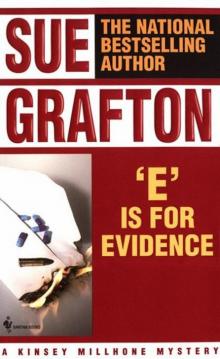 E Is for Evidence
E Is for Evidence T Is for Trespass
T Is for Trespass C Is for Corpse
C Is for Corpse U Is for Undertow
U Is for Undertow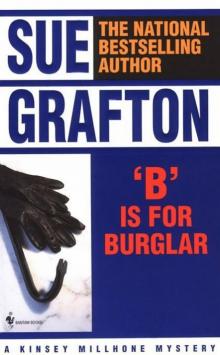 B Is for Burglar
B Is for Burglar Four Sue Grafton Novels
Four Sue Grafton Novels D Is for Deadbeat
D Is for Deadbeat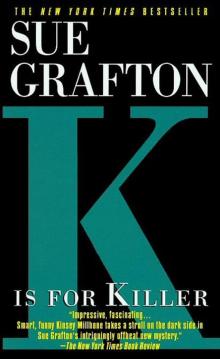 K Is for Killer
K Is for Killer I Is for Innocent
I Is for Innocent A Is for Alibi
A Is for Alibi F Is for Fugitive
F Is for Fugitive Q Is for Quarry
Q Is for Quarry W Is for Wasted
W Is for Wasted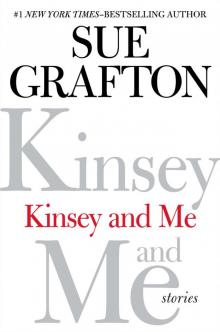 Kinsey and Me: Stories
Kinsey and Me: Stories L Is for Lawless
L Is for Lawless Y Is for Yesterday
Y Is for Yesterday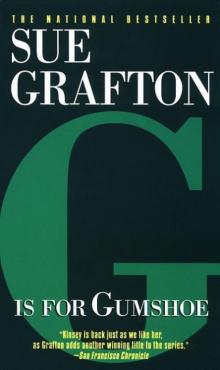 G Is for Gumshoe
G Is for Gumshoe O Is for Outlaw
O Is for Outlaw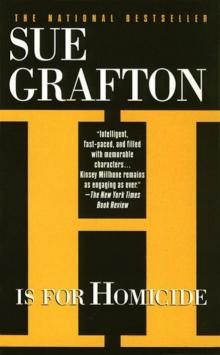 H Is for Homicide
H Is for Homicide X
X N Is for Noose
N Is for Noose Three Complete Novels: A Is for Alibi / B Is for Burglar / C Is for Corpse
Three Complete Novels: A Is for Alibi / B Is for Burglar / C Is for Corpse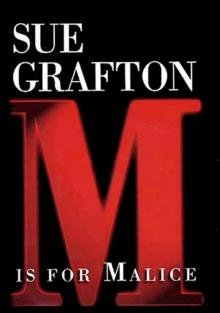 M Is for Malice
M Is for Malice I is for INNOCENT
I is for INNOCENT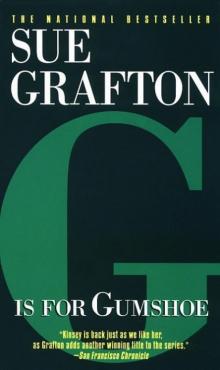 G is for GUMSHOE
G is for GUMSHOE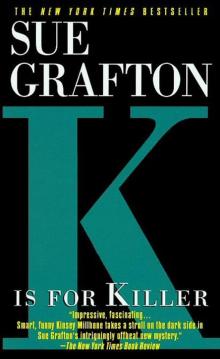 K is for KILLER
K is for KILLER S is for SILENCE
S is for SILENCE N is for NOOSE
N is for NOOSE D is for DEADBEAT
D is for DEADBEAT V is for Vengeance
V is for Vengeance U is for Undertow
U is for Undertow W Is for Wasted km-23
W Is for Wasted km-23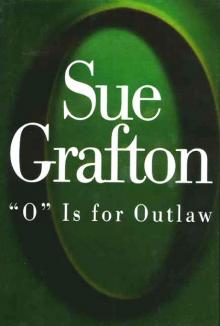 O is for OUTLAW
O is for OUTLAW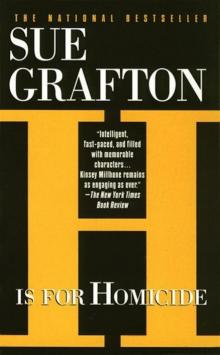 H is for HOMICIDE
H is for HOMICIDE Sue Grafton Novel Collection
Sue Grafton Novel Collection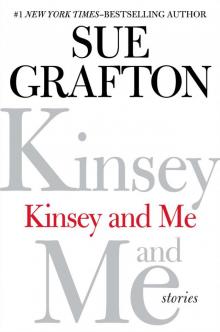 Kinsey and Me
Kinsey and Me C is for CORPSE
C is for CORPSE F is for FUGITIVE
F is for FUGITIVE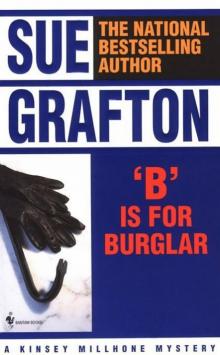 B is for BURGLAR
B is for BURGLAR P is for PERIL
P is for PERIL A is for ALIBI
A is for ALIBI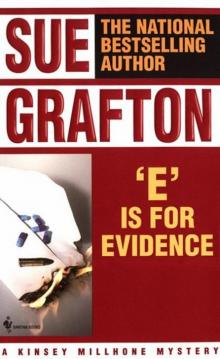 E is for EVIDENCE
E is for EVIDENCE J is for JUDGMENT
J is for JUDGMENT Q is for QUARRY
Q is for QUARRY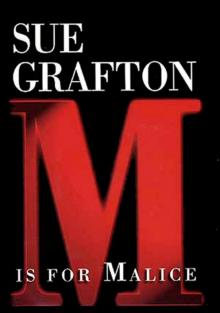 M is for MALICE
M is for MALICE L is for LAWLESS
L is for LAWLESS